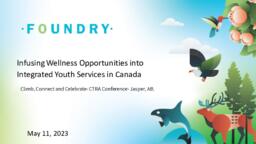Wenger, Matt
Person Preferred Name
Matt Wenger
Related Works
Content type
Digital Document
Abstract
<p><b>Background</b> Appropriate health services and health promotion strategies for young people with mental health and substance use (MHSU) concerns are critical for recovery. Foundry, an integrated youth services (IYS) initiative for young people ages 12-24 in British Columbia (BC), Canada, has recently added leisure and recreational activities (referred to as the Wellness Program) into its services. The objectives of this study were to: (1) describe how the Wellness Program was implemented over a two-year period into IYS (2) provide an overview of what the Wellness Program is, who accessed the program since inception and initial evaluation results.</p>
<p><b>Methods</b> This study was part of the developmental evaluation of Foundry. A phased approach was used to implement the program at nine centres. Data was accessed from Foundry’s centralized platform ‘Toolbox’ and included activity type, number of unique youth and visits, additional services sought, information about how youth found out about the centre, and demographics. Qualitative data was also accessed from focus groups (n=2) conducted with young people (n=9).</p>
<p><b>Results</b> Over the two-year period, 355 unique youth accessed the Wellness Program, with 1319 unique visits. Almost half (40%) of youth identified the Wellness Program as the first point of access to Foundry. A total of 384 different programs were offered targeting five wellness domains (physical, mental/emotional, social, spiritual, and cognitive/intellectual). The majority of youth identified as young girls/women (58.2%), 22.6% as gender diverse, and 19.2% as young men/boys. The mean age was 19 years, and most participants were between the ages of 19-24 years (43.6%). From the thematic analysis of focus groups, we found young people enjoyed the social aspect of the program with peers and facilitators, and identified program improvements that are being considered as the program grows.</p>
<p><b>Conclusions</b> This study provides insight into the development and implementation of leisure-based activities
(known as the Wellness Program) into IYS and can be used as a guide by international IYS initiatives. The initial reach
of programs over two years is promising, and these programs are acting as a potential gateway for young people to
access other health services.</p>
Origin Information
Content type
Digital Document
Abstract
<p>Presentation delivered at the <a href="https://ctra2023.my.canva.site/">Canadian Therapeutic Recreation Association (CTRA) Conference</a>, Jasper, Alberta (May 10-12, 2023).</p>
<p>Exploring the experiences of young people and staff in the Foundry Wellness Program within integrated youth services in Canada. This oral presentation explores findings which impact self-reported health and social connections for young people, and relates primarily to advancement of the profession. Using a participatory action approach, a collaborative team was formed with youth peer evaluators and researchers.</p>
Origin Information
Content type
Digital Document
Abstract
<p>Presentation delivered at the <a href="https://ctra2023.my.canva.site/">Canadian Therapeutic Recreation Association (CTRA) Conference</a>, Jasper, Alberta (May 10-12, 2023).</p>
<p>"Infusing Wellness Opportunities into Integrated Youth Services in Canada" examines leisure-based programs and thriving community partnerships that provide innovative health promotion strategies for young people with mental health and substance use concerns. This oral presentation aligns with task domains for foundational knowledge, implementation and advancement of the profession.</p>
Origin Information



